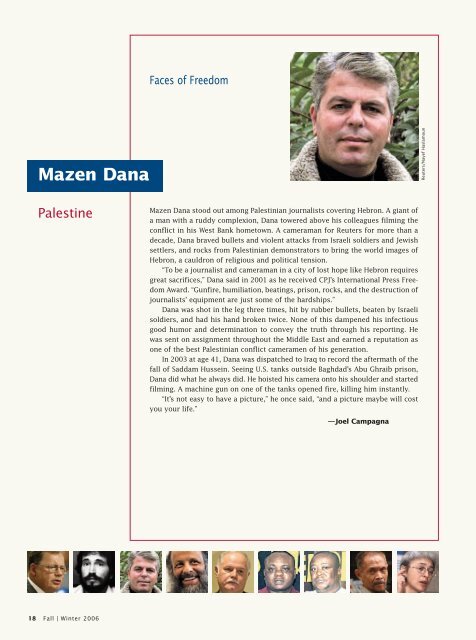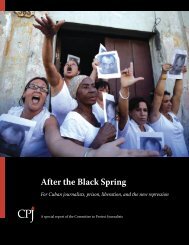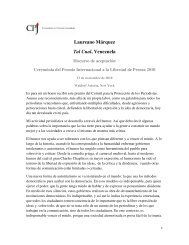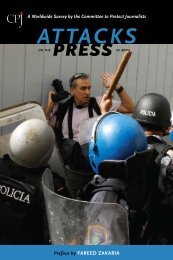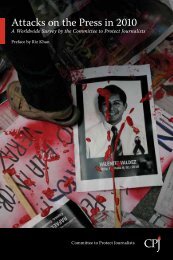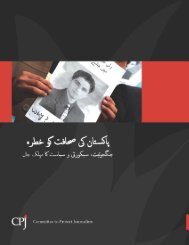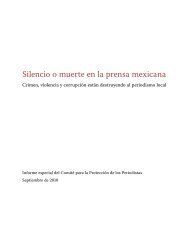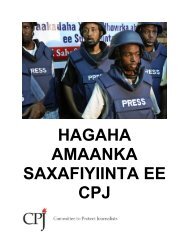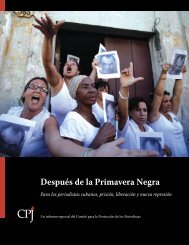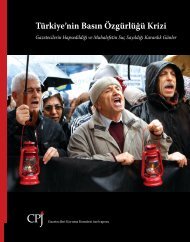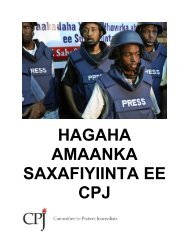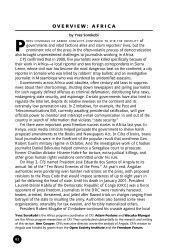Read the magazine online (PDF) - Committee to Protect Journalists
Read the magazine online (PDF) - Committee to Protect Journalists
Read the magazine online (PDF) - Committee to Protect Journalists
Create successful ePaper yourself
Turn your PDF publications into a flip-book with our unique Google optimized e-Paper software.
Cover S<strong>to</strong>ry | Deadly News<br />
enforcement bureau dedicated <strong>to</strong> seizing <strong>the</strong> assets of<br />
criminals, which relies on tracking tax records—<strong>the</strong> same<br />
investigative method pursued by Guerin herself.<br />
The mechanisms of war—mines, artillery, shrapnel, rifle<br />
fire—have claimed <strong>the</strong> lives of 107 journalists since<br />
1992, making crossfire in combat <strong>the</strong> second-leading cause<br />
of journalist deaths. It is <strong>the</strong> combat arena in<strong>to</strong> which most<br />
foreign correspondents plunge, and so, <strong>to</strong>o, where <strong>the</strong>y are<br />
most often killed. Of <strong>the</strong> 89 foreign correspondents killed<br />
since 1992, 49 died in combat-related crossfire.<br />
Michael Kelly, <strong>the</strong> Atlantic Monthly edi<strong>to</strong>r and Washing<strong>to</strong>n<br />
Post columnist, was <strong>the</strong> first U.S. journalist killed in Iraq. He<br />
was embedded with U.S. troops when <strong>the</strong> Hummer in which<br />
he was riding on <strong>the</strong> outskirts of Baghdad swerved in<strong>to</strong> a<br />
canal while attempting <strong>to</strong> avoid enemy fire in April 2003.<br />
But Kelly’s death, coming less than a month after <strong>the</strong><br />
war began, became <strong>the</strong> exception in Iraq. More than half of<br />
journalist deaths <strong>the</strong>re have been murders, and <strong>the</strong> majority<br />
of <strong>the</strong> victims have been Iraqis. Common are cases such<br />
as that of Nadia Nasrat, an anchor for <strong>the</strong> Coalition Authority-sponsored<br />
Diyala TV, who was killed in 2004 when<br />
insurgents targeted a bus transporting <strong>the</strong> station’s<br />
employees. <strong>Journalists</strong> affiliated with U.S. or o<strong>the</strong>r Western<br />
interests were in <strong>the</strong> cross-hairs in <strong>the</strong> war’s first two years.<br />
As sectarian violence spiraled, some CPJ sources speculate,<br />
journalists were also targeted because of <strong>the</strong>ir news organizations’<br />
real or perceived sectarian affiliations.<br />
<strong>Journalists</strong> in conflict zones have often been targeted<br />
for <strong>the</strong>ir supposed affiliations, CPJ’s analysis found. In<br />
Algeria’s Islamist struggle in <strong>the</strong> early 1990s and Turkey’s<br />
flare-up of fundamentalism in 1992, political groups<br />
declared as enemies media seen as representing secular<br />
values. During Rwanda’s genocide, journalists were targeted<br />
regardless of ethnicity for being seen as supportive of<br />
peace and political reform. Murder goes virtually unpunished<br />
in conflict-ridden countries, where police and judicial<br />
systems are typically dysfunctional.<br />
The parameters are different in combat-related deaths,<br />
those in which journalists are killed by shelling, sniper, air<br />
attacks, or o<strong>the</strong>r acts of war. While journalists are not nec-<br />
James Miller<br />
essarily targeted in <strong>the</strong>se cases, CPJ has found that <strong>the</strong>ir<br />
deaths often could have been avoided had an army’s own<br />
rules of engagement been properly followed. Responsibility<br />
is murky in many of <strong>the</strong>se cases, largely because <strong>the</strong><br />
killings are rarely subjected <strong>to</strong> a thorough or impartial<br />
investigation.<br />
In Iraq, for example, CPJ’s analysis found no evidence<br />
that U.S. forces deliberately targeted any of <strong>the</strong> 14 journalists<br />
killed by its soldiers—but it also found that <strong>the</strong> U.S.<br />
military failed <strong>to</strong> fully investigate <strong>the</strong> killings.<br />
That pattern was replicated worldwide. CPJ found 22<br />
cases in which family or colleagues sought investigations<br />
in<strong>to</strong> combat-related journalist deaths. In 14 of those cases,<br />
ei<strong>the</strong>r no action was taken or results were not made public.<br />
Investigations exonerated soldiers in <strong>the</strong> eight o<strong>the</strong>r cases.<br />
Take <strong>the</strong> case of James Miller, a British documentary<br />
filmmaker shot in <strong>the</strong> neck by an Israel Defense Forces officer<br />
in <strong>the</strong> Gaza Strip in May 2003. Crew members, who had<br />
just wrapped up a day of filming, said <strong>the</strong>y were wearing<br />
jackets and helmets marked “TV” and were holding a white<br />
flag illuminated by a flashlight. Israeli officials declined <strong>to</strong><br />
bring criminal charges or take disciplinary action even as<br />
<strong>the</strong>y acknowledged that <strong>the</strong> officer violated military rules<br />
AP<br />
of engagement and gave conflicting accounts of his actions.<br />
“James’ family is deeply disappointed and frustrated<br />
that, in over three years since his killing, <strong>the</strong>re has never<br />
been a proper, open, and transparent investigation by <strong>the</strong><br />
Israelis in<strong>to</strong> his death,” said Liz Sich, a Miller family friend<br />
and spokesperson.<br />
Journalist deaths typically spike in times of war, from<br />
about 26 in years without major conflict <strong>to</strong> roughly 46<br />
in years of significant warfare. Several of <strong>the</strong> deadliest<br />
countries for journalists—Iraq, Algeria, Colombia, and<br />
Bosnia, for example—reflect <strong>the</strong> wars that have endangered<br />
all citizens.<br />
But CPJ also found that <strong>the</strong> worst countries include Russia<br />
and <strong>the</strong> Philippines, where war was not <strong>the</strong> leading fac<strong>to</strong>r.<br />
In those nations, systemic investigative shortcomings<br />
and institutional efforts <strong>to</strong> gloss over <strong>the</strong> problem contributed<br />
<strong>to</strong> <strong>the</strong> <strong>to</strong>ll by creating a climate of impunity.<br />
In <strong>the</strong> Philippines, where more than 80 percent of <strong>the</strong><br />
public gets its news from radio, broadcast commenta<strong>to</strong>rs<br />
constitute <strong>the</strong> majority of victims and local government<br />
officials <strong>the</strong> bulk of suspects. But <strong>the</strong> rare cases that go <strong>to</strong><br />
court are sidetracked because witnesses are killed, threatened,<br />
or coerced, while corrupt local police and justice officials<br />
do little <strong>to</strong> intervene.<br />
Marlene Garcia-Esperat, a well-regarded Philippine<br />
broadcaster and columnist whose anti-graft message<br />
earned <strong>the</strong> ire of local officials, was shot in her Tacurong<br />
home in front of her horrified family on Easter weekend in<br />
2005. Garcia-Esperat’s case quickly went <strong>to</strong> court, only <strong>to</strong><br />
have <strong>the</strong> judge dismiss indictments against two high-profile<br />
officials. Witnesses say <strong>the</strong>y are being threatened, and<br />
<strong>the</strong> case is stalled.<br />
In Russia, <strong>the</strong> spread of capitalism and private investment<br />
fueled business corruption, along with a breed of<br />
journalist eager <strong>to</strong> probe <strong>the</strong> connections between money,<br />
crime, and politics. The ensuing retaliation extended <strong>to</strong><br />
even high-ranking news executives.<br />
Yet Russian authorities turn a blind eye <strong>to</strong> work-related<br />
motives in journalist deaths. In at least four cases since<br />
2000, CPJ found, Russian authorities classified journalist<br />
<br />
<br />
<br />
<br />
<br />
<br />
36 Fall | Winter 2006<br />
Dangerous Assignments<br />
37


